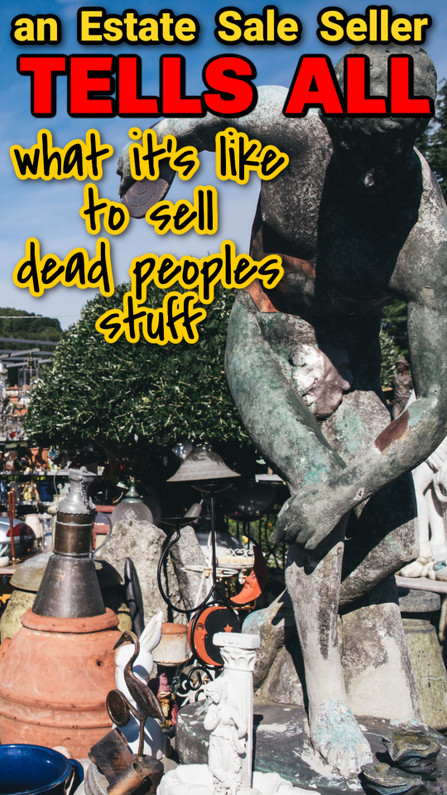An Estate Sale Seller Tells All: What Its Like to Sell Dead Peoples Stuff
Have you ever wondered what it's like to run Estate Sales for a living? Is "Selling Dead Peoples Possessions" fun? Do you make a lot of money?
I came across this utterly fascinating article that appeared on GetPocket.com. It is authored by Cameron Maynard and I think it is so incredibly interesting that I wanted to republish it in full, which is something I have only done one time before because I prefer to write my own content, however this is so skillfully written and so captivating that I felt I would be doing a disservice to the author by paraphrasing their work. Enjoy ~
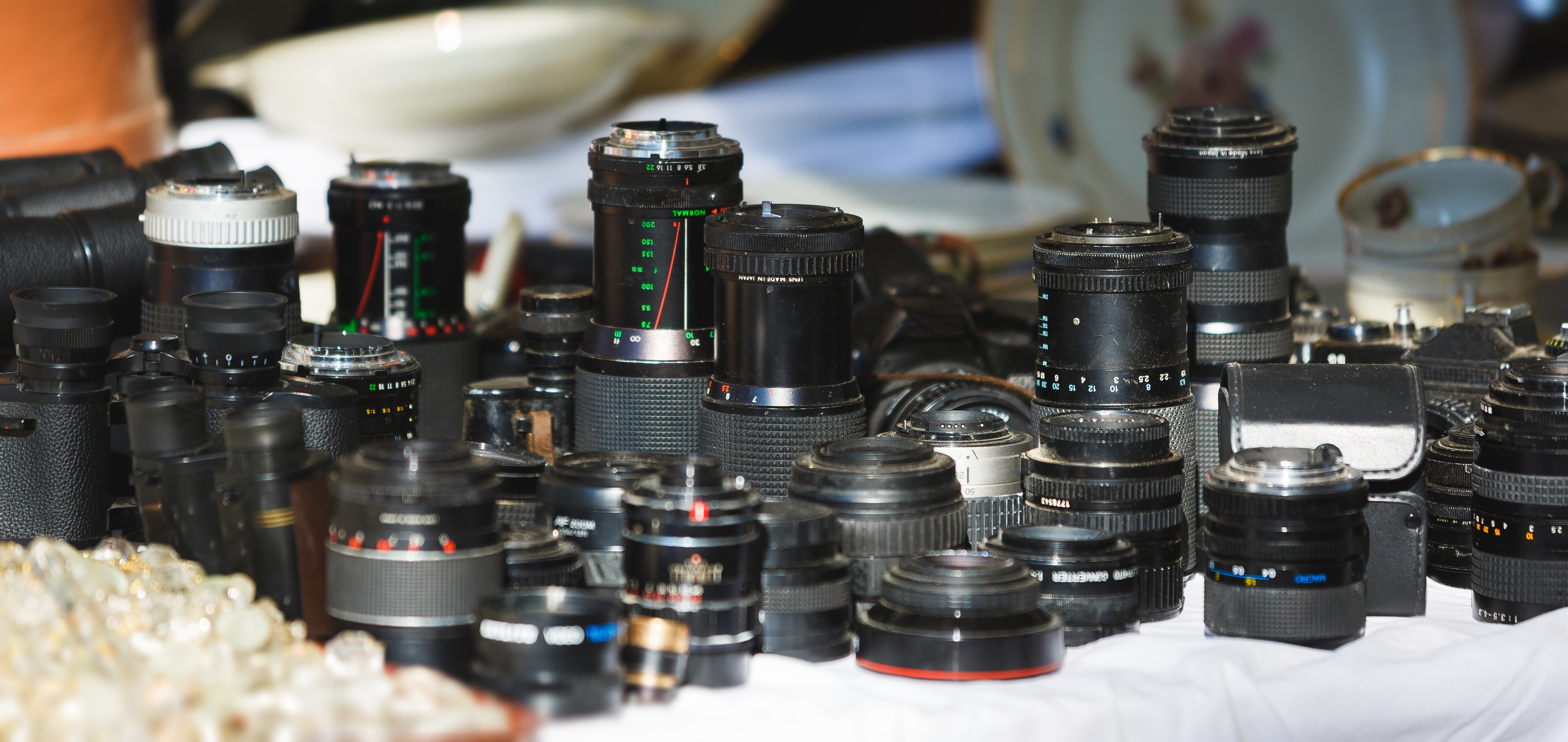
"I was put to work at the age of 8. For a few bucks an hour, I walked around dead people’s homes pretending to look at stuff. I picked up toys and pretended to play with them. I wandered into master bedrooms and stuck my feet in too-big dress shoes. If nobody was around, I walked over to the kitchens to look at novelty coffee mugs with fading images of Graceland or Destin or Hawaii. Sometimes I just sat in living rooms and pretended to read the Bible.
At the time, it seemed pretty normal. My mom ran a small estate-sale business, so working for her was more like quality time than a subversion of any child labor laws. The point of all this was to remain incognito. I saw it more as a secret mission than an actual job. But the goal was clear: Pretend to be a kid who’s strayed too far from his mother and make sure people don’t steal stuff. You’re a security guard in tiny street clothes.
For a long time, I loved it. I loved dragging my feet across the shag carpets and watching people try on jackets that hadn’t been worn in two decades — jackets that looked terrible on them. I loved seeing old men fiddle with out-of-date DVD players and stereos, plugging and replugging them into walls, flipping them over to see if they could find something wrong with them. I loved the flatulent old man that showed up in his USPS uniform and slurred the words “You got any rare coins?” like he was stockpiling for the next Great Depression.
More than anything, I loved the frenetic action.
My dad always told me we came from carnies, grifters, and, to put a face on it, Arkansas. All of this fit with what my mother did. She was the perfect example of the Republican small-business owner — struggling yet, paradoxically, “free” — but at the end of the day her trade was less about independence and more about junk. She just loved being surrounded by junk. The immersion of it. The negotiations around it. She loved storming a house stuffed to the gills with useless possessions, diving in like a platform Olympian. She was a horse trader of dead people’s belongings who was obsessed with finding pearls buried in shit. Once she had a contract, she would spend day and night clearing out cabinets, filling dumpsters with trash, and wedging herself into the crawlspaces and attics of old homes, searching for lost treasure. She once found a diamond ring in a piece of crumpled tinfoil that had been stored in the rotting wall of a garage. She found $10,000 wound up in a rubber band and stashed in a spice jar underneath a loose floorboard. And one time, mythically, she found a Patek Philippe watch just resting in a sock — I don’t know where the sock was.
But like a prospector during the Gold Rush, her victories were rare. Most months she sat around fretting about her empty calendar, constantly threatening to put our house on the market. She chain-smoked and drank wine and played solitaire — computers were still a new thing for most Americans then — or spoke on the phone to her cousins late into the night. When I was young, I thought the good times were much better than they were. She would bring home box after box of old costume jewelry and sift through it, taping little price tags of $5, $15, $25 to the ends. I thought it was expensive stuff, like the jewelry movie stars or the Queen of England wore, and I didn’t realize that a box of plastic jewelry would hopefully get us fed for a week or two.
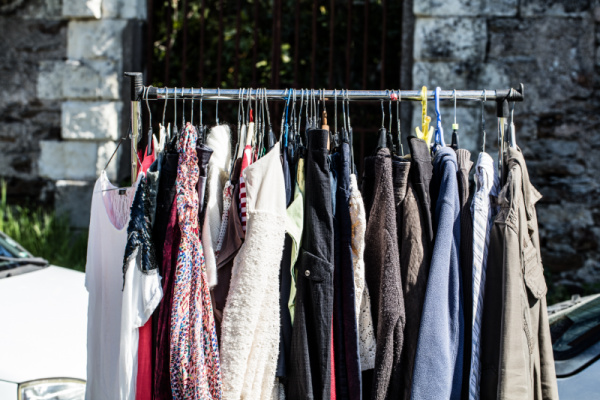
By the time I hit middle school, I had graduated to the cash register. A folding table with a linen tablecloth draped over it usually sat next to the front door, so you could take money and monitor who was coming in and going out. My mom typically ran the cash register, but my growth of responsibility was also an exercise in her learning to let go. She ran the business with the fist of a Soviet premier, and as much as I wanted to measure up, I could never quite muster a tongue as sharp as hers. Someone might ask her how much a used shampoo bottle was, and she would say “Twenty-five cents,” which might prompt a snort or a comment of “It’s not worth twenty-five cents,” at which point my mom would snatch the bottle from the person’s hand and shout “It’s not for sale! Too late! It’s not for sale! Not to you!” And no matter how many times this happened, she would always wonder: “What do they expect? For me to say ‘Just take it?’” Which they did. They always wanted something for free.
But that’s how a lot of people act at estate sales. They come looking for bargains and freebees, and if they can’t find any they just wander around the house to look at the disorganized remnants of a life extinguished.
When I finally got a car, I graduated to putting up yard signs on the intersecting streets, playing a cat-and-mouse game with the city’s sign-enforcement people, who were dead set on taking them down. I’d put one up on Montclair and then have to go check and see if it was still there two hours later. If it was gone, I’d haul a new yellow Estate Sale sign stapled to a wooden spike out of my car, look up and down the street, and hammer it into the empty hole. Each sign had a giant arrow drawn in black Sharpie on the bottom, and people would drive around, following the signs until they found us. This way to examine the dead, I wanted to write. Right this way to seek your fortune in the ashes of another.
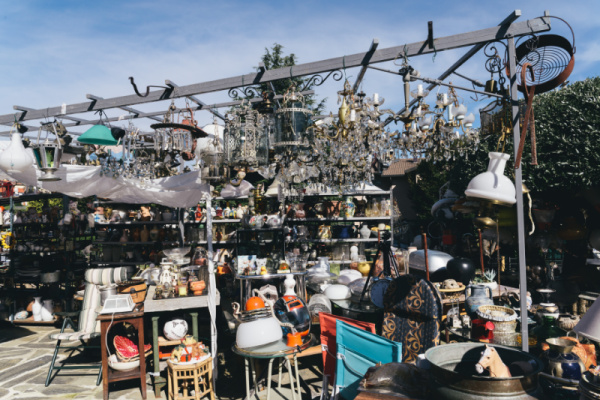
Most of the things I learned during adolescence, I learned at estate sales. I learned how to negotiate with people, how to tell people “no.” I learned that if you listen to people, just stay quiet and let them talk, they will often tell you their best and most interesting stories. But I also learned that people won’t always tell you what they believe, but what they want you to believe.
At one sale, I approached my mother at the cash register and told her I’d seen an old woman putting a small glass elephant in her purse. It couldn’t have cost $15, but the woman slyly slipped it into her bag and walked around the dining room pretending to look at the pictures on the walls, her nose high in the air as if trying to counteract the temptation to look down in shame. When I told my mother, she said, “Well, go get it.” That was it. Not a plan, not some corporate method for deescalating a potentially hostile situation, just “Well, go get it.”
I walked over to the woman — I was about 16; she, easily 80 — and said, “Excuse me, ma’am. Do you have that little glass elephant?” She had her purse over one shoulder and had already been clutching the straps with both hands, securing the purse close to her the way you might on the subway after dark. “What?” she snapped.
“I think you may have the glass elephant that was sitting on that shelf,” I said, pointing idiotically to the shelf, as if its emptiness, its lack of said glass elephant, was evidence enough for my accusation.
“I don’t have any glass elephant,” she said, and started to walk away.
“Ma’am,” I said, grabbing her elbow —
“Let go of me!”
My blood pressure spiked. I could feel the pulse in my neck. This little old woman looked frail, the way she shuffled her feet, the way she looked like she might tip over if somebody in the house sneezed, and here I was accusing her of thievery.
I leaned forward and very quietly said, “Ma’am, you have the elephant.”
“I don’t have any fucking elephant!” she screamed. “You little shit!”
She shuffled toward the living room, and I grapevined around her. My knees were shaking. “Let me look in your bag,” I demanded.
“You little shit!” I could see a small crowd gathering in the doorways and open hallway connected to the living room, her refrain echoing throughout the house.
She thrust her bag at me, holding it open, and for a brief moment I saw a tangle of lipsticks and gum and used Kleenex. But as fast as she had thrust it at me, she retracted it. She stormed out the front door, and I could hear her shouting “Little shit!” until she had made it to the end of the block. And just as quickly as it had happened, everything went back to normal. People started filtering around the house; my mom, with a customer, returned to her calculator. Once I had stopped sweating, I walked over to the cash register expecting a reprimand. “Did she have it?” my mom asked. I thought for a moment and shrugged. “I didn’t see it, but it happened so fast.”
My mom leaned back in her chair and looked out the door. “She had it. That woman’s house is probably a goldmine.” But a goldmine of what? Stolen trinkets? Of blown-glass unicorns and porcelain ashtrays? Whatever could be stuffed into a purse and wasn’t valuable enough to keep near the cash register? What should have been a lesson in shoplifting or conflict resolution unveiled an even seedier truth about people: that no one, not even my mother, was above envy, even if it boiled down to nothing more than having, or not having, a cheap glass elephant.
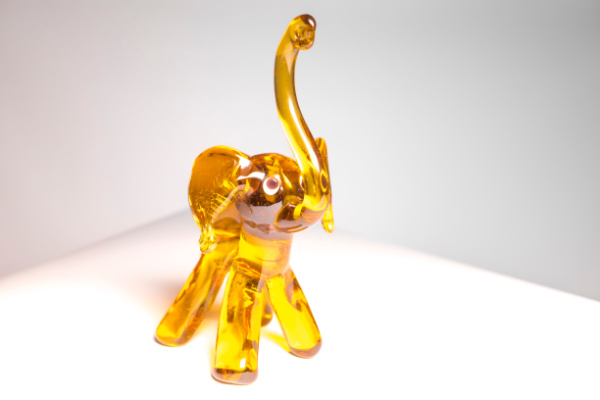
By the time I was in college, the idea of divvying up dead people’s belongings felt weirder than ever. It had started to feel strange in high school, as I realized that all of my friends’ parents had high-paying white-collar jobs. And at some point, I started to get tired of opening Christmas presents and finding things that had clearly come from one of my mother’s estate sales. But still, I never considered turning my back on the profession of “junking” — until my mom was contracted to run an estate sale for my father’s dead aunt. My parents had been divorced a long time, but they still kept in contact, so it followed that she would organize the sale.
During a college break, I came back to work the sale, since I was curious about this dead great-aunt, a woman I’d never met. I arrived during the presale — a time when we gutted the house like an episode of Fixer Upper — and started going through old boxes and drawers. I came across a small shoebox that had nothing in it but old letters. I sat on the crosshatched floor of the condo’s living room — this giant room lined with floor to ceiling mirrors, a crystal chandelier hanging from the crown molding; my great-aunt, I was told, had been a ballroom dancer — and opened the shoebox to take a closer look at what I’d found. Inside were old envelopes that had been addressed to her, and the letters were from a guy I’d never heard of who was deployed in France during World War II.
The letters started innocently enough. He missed her and loved her and wanted to see her. I had to intuit her responses from what he said letter after letter, and I rifled through each one, listening to his tone, more intrigued by his descriptions of the war than anything else. He talked about the blown-out building they were living in, the small bits of fighting he had seen, how one of his friends had died, or so he had heard. He seemed fairly tolerant about the whole thing, calm yet so desperate to see her again. When I first read, I hope you’ll write again soon, I didn’t think much of it. This guy was firing off a letter every few days, and nobody could maintain that kind of communication, even in the 1940s. But I hope you’ll write again soon turned into I would like to hear about you, which turned into Why have you not written? Are you quite busy? which turned into I can’t express how I miss you, which turned into Please respond when you can, and, ultimately, I am fine. They say the war will end soon. This will be my last letter.
I sat on the floor with the shoebox in my lap and the letters scattered about. There was a trash bag of ball gowns to my right, a cardboard box full of old dance photographs to my left, and amid the noise of things being gutted from closets and items being tossed into plastic bins, I regretted entering the portal of these people’s lives. I felt bad for my great-aunt. Did she enjoy pulling the letters out and reading them, reliving his desperate love in such a tragic place? Had it been comforting to know that someone, at one time, had wanted her attention more than anyone? But my heart broke even more for the young man: alone in a war and ignored until he quietly, plea after plea, removed himself. I was almost crying. What had happened to him, and why did she hold onto the words of someone who had faded away?
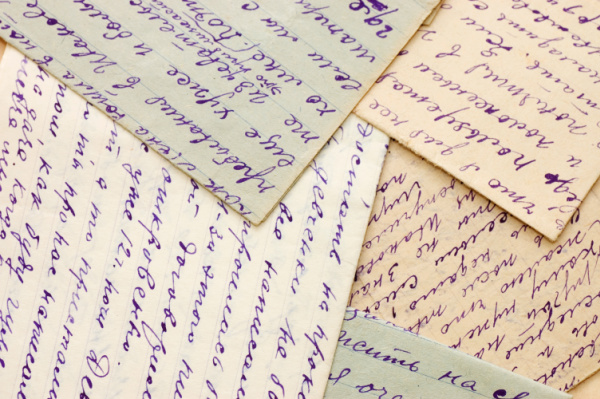
At 21, I already understood the temptation to relive the past. I understood that objects could cover wounds left by the absence of others. I had worn my grandfather’s watch to replace a relationship that his death had prevented; I had kept an ex-girlfriend’s T-shirt to softly cast my mangled heart. But these letters spoke to something darker in the human psyche. They spoke to a side of us that longs for misery during periods of contentment, that chooses to fill our voids with the attentions of others.
In two days, people would be lining up outside the condo, waiting for the door to open so they could run through the house, snatching up all the memories they could get their hands on. In cold calculation, they would move from room to room, grabbing the best objects, looking for items they could quickly turn around and resell or hoard in their homes. And as that happened, these letters would sit on some table, untouched, or briefly rifled through, left scattered about and out of order. The envelopes, preserved for over half a century, would be accidentally torn as shoppers grabbed silverware and lifted furniture over their heads. They would sit, the pleas to Please respond when you can going unanswered and forgotten as high heels that had been worn on first dates and blazers that had been worn on anniversaries were tried on and discarded in corners.
I just couldn’t do it anymore. I couldn’t watch people pick apart someone’s life. I had started doing it too young and too often to ever think of it as anything more than a fun job. For years I had wandered around houses and picked up shoes, plates and books, not thinking about the events surrounding them — if they had been worn to birthday parties or set out when meeting in-laws or stored in carry-ons when visiting college campuses. I had watched televisions get carried out of houses without considering the conversations that had, or should have, taken place in front of them. I had wheeled washing machines out on dollies without wondering whether the kids’ soccer uniforms had been washed in them, if they had successfully removed bloodstains from our collisions with the world. I had accused a woman of stealing a glass elephant, wondering where it was going instead of where it had come from. There was too much history we were siphoning off, some of which, I realized, needed to be buried.
I grabbed the letters and considered keeping them for a brief moment, but what was I keeping? What would scuttling someone’s attempt to purchase them solve, outside of keeping this conversation alive with me? As I stuffed them back in the box, I decided that this would be my last sale. I needed to separate myself from an ecosystem that constantly recycled the detritus of other people’s lives. As much as I loved it, as much as I loved the exchanging of history, I knew I needed my own life of novelty coffee mugs and soon-to-be-outdated electronics. I needed to create my own life of aging objects and fading memories, purchased through my own accomplishments or failures. If I didn’t walk away now, I might continue reliving the lives of others, and someone might wonder, at some estate sale in the not-too-distant future, Why did he keep these letters? Why do all of his things look like they belonged to someone else?"
About the author: Cameron Maynard is a writer and photographer, as well as the nonfiction editor for Carve. His work has been published in Roads and Kingdoms, Huck Magazine, Atlas Obscura, The West Texas Literary Review and Glass Mountain, among others. He teaches English at Richland College.
Recent Posts
-
WhatNot LIVE AUCTIONS LIQUIDATION EVENT! October 15th - Nov 12th!
We are doing a MASSIVE liquidation auction event on WhatNot! Every TUESDAY from October 15th thr …2nd Oct 2024 -
MASSIVE NEWS! 4 HUGE UPDATES Coming to Big Brand Wholesale.com!
We have TONS of exciting news! Check out our Facebook video from July 12th 2024 (below) then keep r …22nd Jul 2024 -
3 COMPANIES PRETENDING TO BE BigBrandWholesale.com! DO NOT ORDER THROUGH IMPOSTERS!
IMPOSTERS! BE CAREFUL!! DON’T BE FOOLED! We now have at least 3 different people PRETENDING to …23rd Dec 2023

